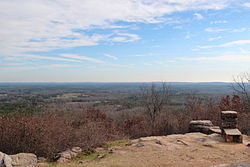F.D. Roosevelt State Park
|
Pine Mountain State Park
|
|

View from Dowdell's Knob.
|
|
| Nearest city | Pine Mountain, Georgia |
|---|---|
| Coordinates | 32°49′55″N 84°48′29″W / 32.83194°N 84.80806°WCoordinates: 32°49′55″N 84°48′29″W / 32.83194°N 84.80806°W |
| Area | 4,568 acres (1,849 ha) (landmarked area) |
| Built | 1934 |
| Architectural style | Bungalow/Craftsman, Other |
| NRHP reference # | 97001273 |
| Significant dates | |
| Added to NRHP | September 25, 1997 |
| Designated NHLD | September 25, 1997 |
F.D. Roosevelt State Park is a 9,049 acres (36.62 km2) Georgia state park located near Pine Mountain and Warm Springs. The park is named for former U.S. President Franklin Delano Roosevelt, who sought a treatment for his paralytic illness in nearby Warm Springs at the Little White House. The western portion of the park, formerly named Pine Mountain State Park, was named a National Historic Landmark in 1997. F.D. Roosevelt State Park is Georgia's largest state park.
Several structures in the park were built by the Civilian Conservation Corps (CCC) in the Great Depression, including a stone swimming pool and Roosevelt's favorite picnic spot at Dowdell's Knob, overlooking the valley below. President Roosevelt would take polio patients suffering from depression along on picnics at Dowdell's Knob.
The region containing the modern-day park was inhabited by the Creek Nation until ceded under the Treaties of 1825 and 1826, which granted the territories between the Flint and Chattahoochee rivers to the State of Georgia. An influx of settlers established the town of Kings Gap, named after King's Trading Post located near the modern-day Liberty Bell Pool. The town eventually vanished by the 20th century.
In 1924, Franklin Delano Roosevelt first visited the warm springs located near the towns of Warm Springs and Bullochville. He came to the springs seeking relief from the symptoms of the paralytic illness he had contracted some years earlier. In 1927, Roosevelt and others established the Warm Springs Foundation, later known as the Warm Springs Institute for Rehabilitation, which established therapeutic programs utilizing the area's mineral springs. Since then, the Institute has developed into a complex of facilities helping those with disabilities.
...
Wikipedia


